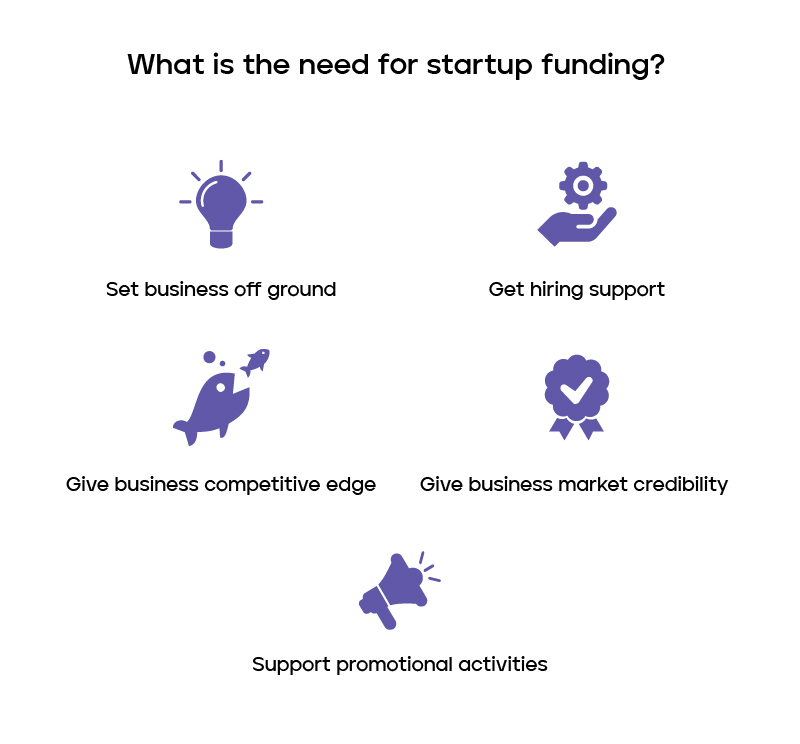The Ultimate Guide to Startup Funding
According to statistics, only 0.91% startups get funded by the angel investors, while a mere 0.05 percent are funded by the VCs.
By teammarquee . December 15, 2021

According to statistics, only 0.91% startups get funded by the angel investors, while a mere 0.05 percent are funded by the VCs. In comparison, 57% startups get funds through credit and personal loan, while 38% get startup funding from friends and family.
For businesses, these numbers can be daunting. But what’s on the other end of the spectrum is not just monetary support but also business growth support.
The process of finding startup business funding can be difficult to manage. In today’s article, we are going to look into the different facets of funding a startup.
We hope that by the end of our extensive guide, you will have everything you need to enter the fundraising journey.
Let us start with the basics – the need for startup fundraising.
What is the need for startup funding?

1. Set business off ground
The primary and most crucial uses of funds is to set the business off ground. Funding a startup can help employees become entrepreneurs by providing them the needed monetary and guidance support to run a hypothesis on the concept and convert it into a product.
2. Get hiring support
Business funding for startups can help them find a great team and make the right hire. It can support the team’s salary till the business starts making profit.
Apart from salary, a brand which gets tagged as being funded, finds it easier to get in skilled people compared to the startups that don’t have any funding help.
3. Give business competitive edge
Startup investment funds can give businesses a competitive edge in the market.
The investors, when they back a company, back them through their business acumen as well – something that cannot be replicated by others in the industry. This combination of monetary and business insight gives businesses a competitive edge, helping them set their own industry standards.
4. Give business market credibility
Businesses, the second they get funding, become credible. Funding, whole and sole, leads to an upped credibility factor which results in businesses getting more customers, better loan rates, and great hiring support.
It goes unsaid that if an investor is backing a company they would have run their due diligence, meaning the brand already has everything that goes into the making of a future industry leader.
5. Support promotional activities
Marketing is one of the primary areas which a startup spends the most on. Afterall, they have to establish themselves in the market where a number of seasoned players are already present. Funding on this front can play a massive role in aiding this business expense.
What are the different startup funding types?
There are different types of startup funding that entrepreneurs choose from when they initiate their business. Right from taking financial support from family and friends to taking the venture capital funding route, there are multiple funding options for startups.
Here are what they are –
1. Series Funding
It is a type of startup fundraising where a startup raises multiple rounds of funds, each being higher in valuation than the previous one and aimed towards increasing the business value. It is usually described in an alphabetical manner starting with Series A which is a seed fundraising round to Series E for businesses that wish to stay private for a longer term or want help with going public.
2. Crowdfunding
This startup business funding approach is all about tapping into the collective effort of a huge pool of individuals – usually from social media or crowdfunding platforms – where their networks are leveraged for greater exposure and reach. Crowdfunding for startups is considered a great option for businesses that have upped their social media game or have an existing network of interested startup investors.
3. Venture Capital
Venture capital is a funding model wherein the goal for the VC firm is high returns, usually in the likes of an IPO or acquisition of the firm. It is a great option for startups looking to scale quickly.
The VC firms are generally run by x number of partners who raise large sums of money from multiple limited partners and invest on their behalf.
4. Angel Investors
They are typically high net worth individuals who put in amounts of their money in startups in returns of high returns or a stake in the business. Out of all the different startup business funding models, angel investment is one of the most probable ones to close. The reason? Angel investors act individually, they don’t have to take a collective decision about the investment with other investors. So, the moment your idea clicks with them, the chances of you securing the funds increases by manifold.
What to include in your pitch deck?
The success of getting startup investment funds depends entirely on the pitch deck you present to the prospective investors. The more convincing and driven it is, the higher would be the chances of you closing the deal with them. At Marquee, we have a team that specializes in the creation of business pitch decks. An expertise that has led to a US based HR company raising $10 million, a US-based FinTech company raising $2 million, among a series of similar success stories.
Here’s what we tell our partnered entrepreneurs when it comes to building a great pitch –
Show that you know the market
The truest way to show the dedication you have towards your business is through showing market expertise. The deck should have details of the size of the target market, the problem area that your product will solve alongwith the size and scope of the problem, the existing solution providers of the issues and what separates you from them.
Having an understanding of where your market is today and where it would be some years down the line, in addition to how your business aligns with it, is what separates an investment friendly idea from their counterparts.
Know your finances
The next part of the pitch deck is the financials. As an entrepreneur you should know every domain of your business inside out. What area is making you money and at what cost and which areas are taking up your working capital but not doing you any good. You should also have a clear knowledge of which expense sources are short terms and which are constant.
Now while you strengthen your understanding about your current finances, it is crucial to gather how much money you need as startup investment funds from the investors. The amount should be backed by data-based business projections. Moreover, you should also have numbers around how much you are willing to let go of your stake in return of the money you are demanding.
Highlight what is in it for the investors
The exit strategy is that part of the pitch which tells investors what is in it for them. Every investor is apprehensive about backing a startup, assume that the investor you have reached out to will be too. In this scenario, it is important to chart what is in it for them. There are two ways to go about it.
- Give them your future projections in terms of business model – whether you are planning to acquire a new company, expand into a new business, planning to go public, etc. And add their role in every stage.
- Give them an exit strategy. Tell them what they will leave the table with if the business fails to succeed.
These factors together can help you present a well-strategized and thought through image of your brand to the investors – making you come one step closer to ending the startup funding process on a profitable note.
So here were the basics to get you prepped for entering the world of raising funds for your business. But note that with this, we have only scratched the surface. There is still a lot to know about how funding works, where to find investors, how to pitch them in a way that is impossible to refuse, etc.
In the upcoming set of articles, we will answer these and a lot of other burning questions around funding and investments. In the meantime, if you need any funding support for your business, reach out to us.
We optimize & accelerate growth for already great products.

Business Investors Near Me: A Local Perspective
Local investors are the heartbeat of community-driven growth. Beyond funding, they bring insights, connections, and shared values. In the nexus of business and locality, their presence becomes a catalyst, propelling businesses to thrive within the unique tapestry of our local landscape.

